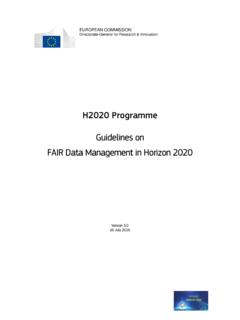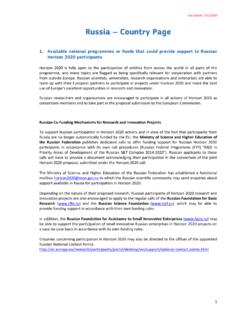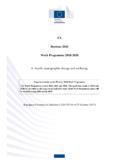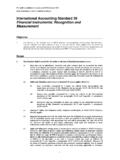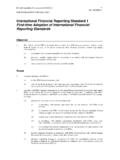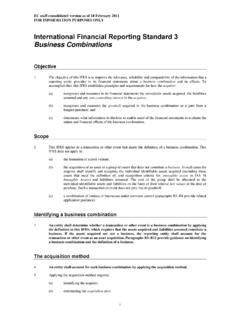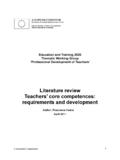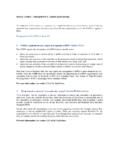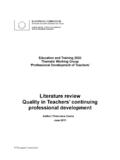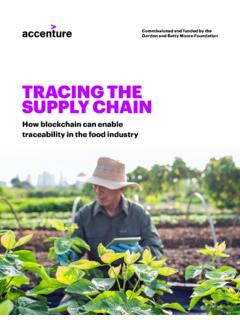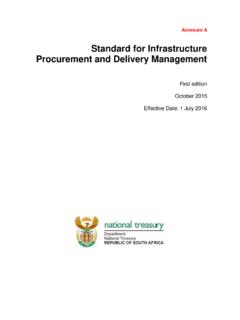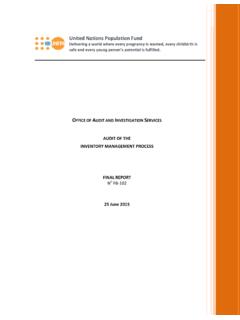Transcription of commodities and products associated with deforestation and ...
1 EN EN EUROPEAN COMMISSION Brussels, COM(2021) 706 final 2021/0366 (COD) Proposal for a REGULATION OF THE EUROPEAN PARLIAMENT AND OF THE COUNCIL on the making available on the Union market as well as export from the Union of certain commodities and products associated with deforestation and forest degradation and repealing Regulation (EU) No 995/2010 (Text with EEA relevance) {SEC(2021) 395 final} - {SEC(2021) 396 final} - {SWD(2021) 325 final} - {SWD(2021) 326 final} - {SWD(2021) 327 final} - {SWD(2021) 328 final} - {SWD(2021) 329 final} EN 1 EN EXPLANATORY MEMORANDUM 1. CONTEXT OF THE PROPOSAL Reasons for and objectives of the proposal deforestation and forest degradation are occurring at an alarming rate, aggravating climate change and the loss of biodiversity.
2 The main driver of deforestation and forest degradation is the expansion of agricultural land to produce commodities such as cattle, wood, palm oil, soy, cocoa or coffee. A growing world population and increasing demand for agricultural products especially those of animal origin is expected to increase demand for agricultural land and put additional pressure on forests, while changing climate patterns will affect food production, necessitating a shift to a sustainable production that is not leading to further deforestation and forest degradation. The EU is a relevant consumer of commodities associated with deforestation and forest degradation and it lacks specific and effective rules to reduce its contribution to these phenomena.
3 The objective of this initiative is therefore to curb deforestation and forest degradation that is provoked by EU consumption and production. This, in turn, is expected to reduce GHG emissions and global biodiversity loss. The initiative aims to minimise consumption of products coming from supply chains associated with deforestation or forest degradation and increase EU demand for and trade in legal and deforestation free commodities and products . Consistency with existing policy provisions in the policy area The proposal was first announced in the 2019 Commission Communication on Stepping up EU Action to Protect and Restore the World s Forests1 (hereinafter 2019 Communication ), where the Commission committed to assess additional demand side regulatory and non-regulatory measures to ensure a level playing field and a common understanding of deforestation free supply chains, in order to increase supply chain transparency and minimise the risk of deforestation and forest degradation associated with commodity imports in the EU.
4 This commitment was then confirmed in the European Green Deal,2 as well as the 2030 EU Biodiversity Strategy3 and the Farm to Fork Strategy4, the latter two announcing a corresponding legislative proposal in 2021. The proposal is an integral part of and coherent with the overall objectives of the European Green Deal and all the initiatives developed thereunder. In particular, it is complementary with the other measures proposed in the 2019 Communication, notably: 1) work in partnership with producer countries, to address root causes of deforestation , and to promote sustainable forest management , and 2) international cooperation with major consumer countries, to minimise leakage and to promote the adoption of similar measures to avoid products coming from supply chains associated with deforestation and forest degradation being placed on the market.
5 1 Communication from the Commission to the European Parliament, the Council, the European, Economic and Social Committee and the Committee of the Regions, Stepping up EU Action to Protect and Restore the World s Forests, COM/2019/352 final. 2 Communication from the Commission to the European Parliament, the Council, the European, Economic and Social Committee and the Committee of the Regions, The European Green Deal, COM/2019/640 final. 3 Communication from the Commission to the European Parliament, the Council, the European, Economic and Social Committee and the Committee of the Regions, EU Biodiversity Strategy for 2030 Bringing nature back into our lives, COM/2020/380 final.
6 4 Communication from the Commission to the European Parliament, the Council, the European, Economic and Social Committee and the Committee of the Regions, A Farm to Fork Strategy for a fair, healthy and environmentally-friendly food system, COM/2020/381 final. EN 2 EN The Commission will therefore continue to work in partnership with producer countries, offering new types of support and incentives with regard to protecting forests, improving governance and land tenure, increasing law enforcement and promoting sustainable forest management , climate-resilient agriculture, sustainable intensification and diversification, agro-ecology and agroforestry.
7 The existing EU legislative framework addresses deforestation only partially. The EU Forest Law Enforcement Governance and Trade (FLEGT) Action Plan dating from 20035 constitutes the key EU policy against illegal logging and associated trade. While the FLEGT Action Plan tackles illegal logging and associated trade, it does not address deforestation as such. A key element of the FLEGT Action Plan is a voluntary scheme to ensure that only legally harvested timber is imported into the EU from countries agreeing to take part in this scheme. The internal EU legal framework for this scheme is the Forest Law Enforcement, Governance and Trade Regulation (FLEGT Regulation)6, which establishes a licensing system that is the basis for FLEGT Voluntary Partnership Agreements.
8 Another key element of the FLEGT Action Plan is the EU Timber Regulation (EUTR)7, which prohibits the placing of illegally harvested timber and timber products on the EU market and lays down obligations for operators placing timber on the market for the first time. Both the FLEGT Regulation and EUTR have undergone a Fitness Check, and the policy options presented in this Regulation are also drawing from the findings of the Fitness Check. Building upon the experience and lessons learned in the context of the FLEGT Action Plan and Regulation, the Commission will establish forest partnerships with relevant partner countries as appropriate.
9 The Forest Partnerships main objective will be to protect, restore and/or ensure the sustainable use of forest in a comprehensive and integrated way to deliver on the European Green Deal priorities as well as EU s development cooperation objectives like poverty alleviation, good governance, human rights. They will promote forest governance and policy reforms to pursue sustainable forest management and contribute to halting deforestation and forest degradation. Consistency with other Union policies The 2019 Communication sets out the overall objective of protecting and improving the health of existing forests, in particular primary forests, and to increase sustainable, biodiverse forest coverage worldwide.
10 In the context of the European Green Deal, both the EU Biodiversity Strategy for 2030 and the Farm to Fork Strategy characterise this legislative proposal and other measures to avoid or minimise the placing of products coming from supply chains associated with deforestation or forest degradation on the EU market, as important for the achievement of their objectives. Other relevant initiatives include, for instance, the Communication A long-term Vision for the EU's Rural Areas 8. The new EU Forest Strategy confirms that the measures already identified in the 2019 Communication set the basic framework for the EU s global action, including the present 5 Communication from the Commission to the Council and the European Parliament - Forest Law Enforcement, Governance and Trade (FLEGT) - Proposal for an EU Action Plan (COM(2003) 251 final).
